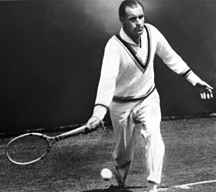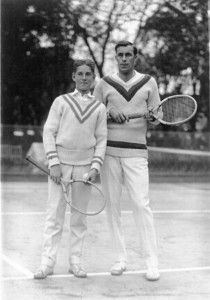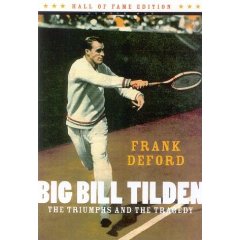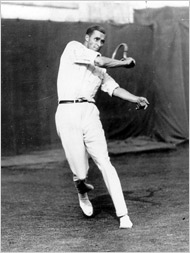Great Men of Tennis: Big Bill Tilden – Tragic Hero?

Big Bill Tilden was Americas first great champion.
Like many tragic sports figures, “the fault lay not in the stars but in himself” for tennis legend William “Bill” Tilden.
Loving the limelight, the footlights and the spotlight, Tilden shunned real life for the artificial, constructing a world he could not inhabit. No one could. Born into wealth and privilege, pampered by an over-protective mother, and held at arm’s length by a grief-stricken father, Tilden was forced into tennis at his father’s insistence.
Tilden showed promise at an early age, but he did not care for the game. Later on he avoided life by playing tennis, finding the soothing rhythm of its point, counter-point a barrier against outside emotional distress.
Big Bill reigned supreme during the 1920s in America, often sharing sporting headlines with notables like Babe Ruth, Bobby Jones, Red Grange, and boxer Jack Dempsey during a time referred to as the golden age of sports. Tilden won every major tournament he entered for six years, including six U.S. Nationals (now called the U.S. Open).
It was his record that Roger Federer onced chased, as he aspired to win his sixth consecutive U.S. Open during the summer of 2009.
Because of his fame—his notoriety—Big Bill felt he was immune from criticism and from the court system. He was openly gay, and excessively flamboyant during an era when such things were not discussed or acknowledged in polite society. His attraction to young boys was renowned, and Tilden did nothing to hide his tendencies from the public.

Bill Tilden on court with Sandy Wiener in 1923.
Eventually as his aberrant appetites increased and he was arrested, his other eccentricities drained him of his fortune. He sank into poverty and disrepute.
Even so, “Big Bill” Tilden continues to be in the conversation as one of the best players in tennis history—especially as one of the best Americans ever to play the game. His influence on tennis remains unparalleled. He advanced the modern game more than any other player over a longer period of time.
As part of an American Press poll taken in 1950, Tilden was almost unanimously voted the best tennis player of the first half of the twentieth century—this only weeks after being released from prison for fondling and making advances toward a teenage boy.
This was 1950 and no one tolerated such behavior. It was an era when we embraced intolerance, closed minds, sexual purity and feared the advance of communism in the guise of the Red Scare.
Tilden’s prowess on the tennis court outweighed his darker nature even during this unforgiving age. The world applauded his skills and rewarded him with this accolade.

Frank Deford's Biography on "Big Bill" Tilden.
Tilden won three Wimbledon titles, seven U.S. Open championships and he also led the United States to seven Davis Cup victories. Frank Deford wrote in his biography Big Bill Tilden, “Playing for himself, for his country, for posterity, he was invincible. Tilden simply was tennis in the public mind.” He dominated the game more than any other player in tennis history.
Remarkably his fame was not achieved until he reached the age of 27. At age 26, after being soundly defeated by “Little Bill Johnston” 6-4,6-4, 6-3 in the finals of the U.S. Nationals, Bill Tilden took matters into his own hands. He used the winter of 1919 to overhaul his game at an indoor court in Rhode Island, constructing a new grip and a powerful new backhand.
In 1920 he became the first American to win Wimbledon. There was no stopping him after that. Tilden was tall, over 6’0″, with long legs and broad shoulders. His serve was extraordinary, often referred to as a cannonball.
It was claimed that his serve was clocked at 163.3 miles per hour, but most experts dispute that, claiming that not only were recording mechanisms suspect, but that the old wooden racket could never generate that speed. His second serve had a real kick that opponents often could not handle.
He played from the back court and picked his opponents apart with pinpoint accuracy and guile as well as chopped and sliced shots, lobs and drop shots. He was a clever player, a student of the game.
He wrote two books about the strategies of playing tennis. His mental acumen is often overlooked in discussing his overall prowess on court. He became so dominant that it is said he would throw opening sets just to make it more interesting for himself—and ultimately the fans.

Tilden was a showman with a powerful serve.
Because ultimately Tilden was a showman. He was always performing for an audience. He said after winning his first two Wimbledon tournaments that it was too easy—so he didn’t play for the next three years. His last win at Wimbledon came many years later when he became the oldest man to win the tournament at age 37 in 1930.
Many refer to the artistry of the Tilden game, insisting that it was the beauty of the game that Tilden pursued more than the victory. The unfolding of the contest was much like a play and Tilden was the consummate actor who loved pleasing his audience.
As Tilden’s fame and fortune grew, so did his eccentricities. Besides his penchant for young men, he began to sink his vast fortune into theater and film projects that failed time after time. His fortune dwindled as his notoriety grew, and soon he was banned from tennis clubs and tournaments because of his blatant homosexual behavior.
He played professional tennis into his late 40s but died penniless at age 60 from coronary thrombosis. It is claimed that he had $88.11 left at his death.
It remains difficult to reconcile Tilden’s off-court behavior with his superlative tennis abilities. Hopefully, Tilden would not suffer as much from his indiscriminate behavior today with modern treatment and a society more accepting of homosexuality.
He never apologized for his lifestyle while he lived, preferring to accord himself the title of “artist.”
He said, “I am not a criminal! I am a tennis player. I feel awkward saying this, but I consider myself an artist, an artist of the game…I have to create…”
He did just that—he helped create the modern game as we know it today. He deserves to be remembered and accorded his place in our collective tennis memory.
[Please read other entries in our series of the Great Men of Tennis. To see our complete list, click here.]


He also was an aspiring playwright and actor, even got a chance to do both at one point in his playing days, and was roundly panned. Definitely an intriguing character, and one without whom tennis might still not be considered a "real sport."
Very comprehensively told, Joan, and it captures the tragedy of a great athlete playing in the wrong time.
Probably the most unusual and controversial of all the figures I have explored in tennis history! It is hard to come away from him feeling entirely sympathetic or entirely unsympathetic. He did make tennis into a "sport" and raised the bar on athleticism – he could be arrogant yet had great love of country and this sport…definitely an enigma! Thanks for the comment…
What a fascinating story. I knew nothing of Tilden, to my shame, before this. I'm now driven to read much more.
It's interesting that you say he may have been more accepted now than in his day. I certainly agree that being a homosexual would not be a factor on today's tour: the work of many great and gay women have ensured that (back to my heroines again!).
But I don't think it's that which would give him problems. He sounds as though he was a man who would have got under the skin of many people for his behaviour. To even hint that he would throw opening sets, and that he would not play Wimbledon because it was too easy, would simply be considered too arrogant, too self-indulgent in today's game.
And I don't think fondling boys is easily to be dismissed – that's rather different from simply being a gay man.
But….I would have loved to see him play! I can imagine the kind of athletic grace he probably brought to tennis (and you know I am as putty over tennis like that!).
Now I have to find a book, but I haven't finished wading through my Wills v Lenglen tome yet, and that's been several months!
PS thank you for stepping in.
Tilden is difficult to embrace because of his off-course behavior and his arrogance but he moved mountains by getting people to accept tennis as a sport and not regard it as a country club activity. He brought the game into the limelight and gave it credentials. He played the game better than any man before and understood the entertainment aspect of sports – he played to please his audience. Thanks – he is a most compelling character, indeed!
No argument with any of that…but BJK managed similar advances in attitudes while also taking the game into new territory for women. And she never felt the need to undermine those around her in doing so.
Surely Tilden played to please himself before the audience. He was fortunate that he had an outstanding talent (and clearly no shortage of financial support to indulge that talent), so was in a privileged situation even outside the country club environs.
Interesting to surmise what he might have done had his father not pushed him into tennis. Sounds like he could have made his name alongside the likes of Barrymore on the stage or in film!
Actually although he fancied himself an actor – he was terrible on stage and he had no ability even to select good projects to back…his best performances were always on the tennis court!
For me, you painted a picture of a character who, up 'til now, was only a great name in tennis.
Of his adult life, it certainly could be said, "he did it his way".
I love sports history. This was wonderfully done!
Thank you – High praise indeed. Tilden is perhaps the most interesting of the many characters I have attempted to write about – equalled almost by Roscoe Tanner! Tilden had amazing abilities and upper class arrogance…just a wonderful character…
tilden was a pedophile and to make it worse a gay pedophile he hired a 17 year old prostitute also just look at him…..i would be uncomfortable near him..no wonder he got kicked he looks like a pedophile just look at the second pic…fag
Excellent post! We are linking to this particularly great article
on our website. Keep up the good writing.